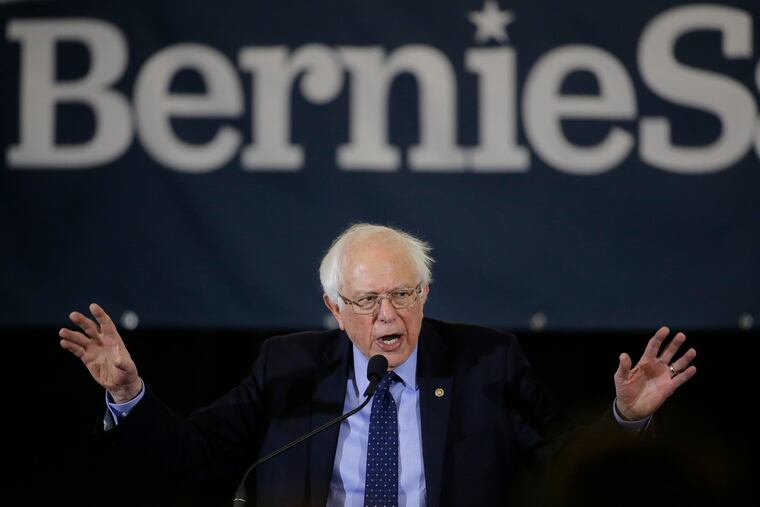As the Democratic race for president cranks up, its moving parts could cause real angst | John Baer
The large field of Democratic presidential candidates is inviting splits over ideology, age and gender that promise to be key in picking a nominee.

Competition to nominate a Democrat for president is looking like a Reuben Goldberg machine: tortured complexity in search of a simple outcome.
The one goal? Pick someone who can beat President Donald Trump.
Easy, say hardcore Democrats. Anybody. And maybe that’s so.
But recent head-to-head surveys (in polls of varying believability, for those who still believe in polls) show a muddled mix of findings.
Since the end of March, there are polls with Joe Biden, Cory Booker, Bernie Sanders, Elizabeth Warren, Kamala Harris, Beto O’Rourke, Kirsten Gillibrand and fast-rising Pete Buttigieg all beating Trump.
There also are polls with Trump beating Booker, Sanders, Warren, Harris, O’Rourke, Gillibrand and Buttigieg. And tied with Biden, who isn’t in but is expected after Easter.
(During that period, in polls compiled by Nate Silver’s FiveThirtyEight, only one head-to-head featured Amy Klobuchar: losing to Trump by 7 points.)
So, either some polls are more suspect than others, polls are worthless at this stage — April 2015 polling, for example, had Florida Sen. Marco Rubio leading a GOP field of 14, which at the time didn’t include Trump — or there’s a whole lot of ifs, buts and maybes out there on a given day, week or month.
Plus, like a Goldberg machine (named for the late American cartoonist Reuben Goldberg, who drew humorous “inventions” of questionable value, such as a self-operating napkin), the race has lots of moving parts.
For the party, that’s creating angst. Starting with how far left it should lean.
Its liberal-to-progressive wing is pulling for big, bold ideas. Free this, universal that, a Green New Deal, and reparations for slavery.
And while the latter issue is always around, it’s more in evidence this election cycle than any other in memory. And it’s an example of divided commitment.
A new Huffington Post poll shows the issue splits Democrats almost evenly. Asked whether the government should make cash payments to black American descendants of slaves, 34 percent said it should, 37 percent said it should not.
(Although head-to-head polling on candidates at this point can be meaningless, polling on issues, in my view, is instructive.)
So, how tight an embrace of liberal issues is needed win the Democratic primary?
Good question. Who knows?
But these are issues Trump and Republicans are ready and willing to label as part of a costly socialist agenda to campaign against.
And if there are splits over ideology, there also are splits over age, maybe even gender (once burnt?).
The age thing first.
The Washington Post last week noted that although Biden and Sanders poll first and second in state and national surveys (which could easily still be a function of familiarity), their support differs across age groups.
A recent CNN Poll of Democratic and Democratic-leaning independent voters found the 76-year-old Biden with less support among younger voters, and the 77-year old Sanders with less support among older voters.
The poll says those under 45 favor Sanders over Biden, 32 percent to 19 percent. And voters 45 and older favor Biden over Sanders, 36 percent to 8 percent.
Presumably, in a general election, most Democrats would vote for either. But the split could be important in picking a nominee.
And what about gender?
Even with six women currently running for president, after mid-terms in which female candidates enjoyed historic success, there still seem to be double standards in play.
Men lead in polls. And Kamala Harris, viewed as a top-tier candidate, is running third in California behind Biden and Sanders despite holding statewide office there as attorney general and U.S. Senator for the last eight years.
National Democratic strategist Eddie Vale told The Hill last week that female candidates still deal with “a lot of latent sexism … from how voters perceive them and how they’re covered” by media.
When male candidates talk about substantive issues, he said, “they’re seen as smart and new;” when female candidates do the same, “they’re too bland or wonky to connect with voters.” Looking at you, Elizabeth Warren.
How these moving parts involving ideology, age and gender are resolved determines a nominee, plus his or her strength going forward.
And the levers and pulleys and springs and sprockets pushing the race are beginning to engage. Reuben Goldberg would have enjoyed that.